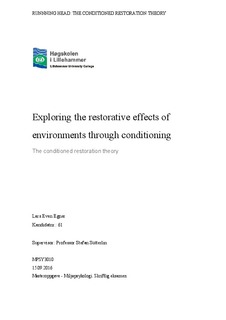| dc.description.abstract | Psychological and physiological restoration have shown to occur in environments
containing nature, such as forests, parks and rooms with a window view to nature. The
thesis explores the option of explaining restoration through a twostep
conditioning model,
named the conditioned restoration theory. Conditioned restoration theory suggests that in a
twostep
process people firstly learn to associate nature with a relaxing emotion, then later
retrieves the same emotion when presented with an associated stimulus. Individual steps of
the models integrate theory from evaluative conditioning and placebo research, as well as
research results from environmental psychology. A study was conducted to further
investigate the proposed conditioned restoration framework, exploring whether restoration
is affected by experience with nature.
A 2x2 randomly assigned, partially doubleblind,
experimental design (N = 31)
examined the effect of viewing pictures of nature and urban environments on the Attention
Network Task, digit span backwards, mood, and investigate the moderation effect of
previous experience with nature. The Experience with Nature in Child and Adulthood
inventory was developed to assess earlier and current experience with nature.
Results suggest that viewing pictures of nature significantly improves the executive
control sub score of attention network task, reduce arousal, and partial signs of an
improved digit span backwards scores. Regression analysis suggest that improvement in
executive control is negatively related to the Love and Care for Nature scale, arousal in
nature as a child, and heart rate variability, as well as positively related to current amount
of interaction with nature. Regression analysis should be interpreted as suggestive and
need replication to validate results.
As predicted by conditioned restoration theory, viewing pictures of nature reduce
arousal, and arousal in nature as a child predicts increase restoration. This suggest low
arousal has been conditioned to nature in childhood, affecting restoration.
Coupled with previous research, the thesis suggests conditioned restoration theory as a
valid framework for the restorative effect of environments, which could prove to be a
major contribution to environmental psychology. | nb_NO |
